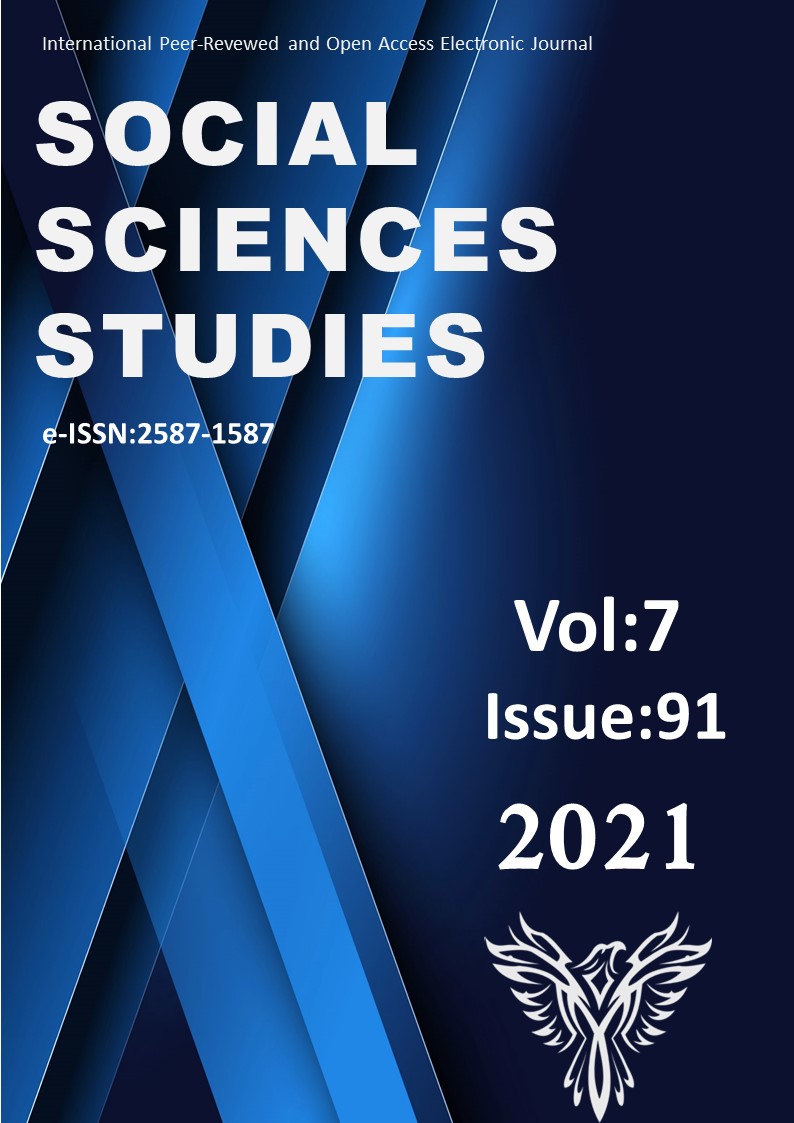Author :
Abstract
Dünya genelinde etkisini sürdürmeye devam eden COVID-19 pandemi sürecinde toplumun en savunmasız ve tecrübesiz kesimini oluşturan ergenlik çağındaki öğrencilerin kaygı ve motivasyon düzeylerinin ne ölçüde etkilenmiş olabileceği merak edilmektedir. Bu araştırma COVID-19 pandemi sürecinde ortaokul öğrencilerinin fen öğrenimine yönelik kaygı ve fen öğrenimine yönelik motivasyonlarının araştırılması amacıyla yapılmıştır. Araştırma2021-2022 öğretim yılında yapılmış olup, katılımcıları Konya il ve ilçelerinde öğrenim gören ortaokul öğrencileridir. Araştırmada, ilişkisel tarama modeli kullanılmıştır. Araştırmada Fen Öğrenimine Yönelik Kaygı Ölçeği ve Fen Öğrenimine Yönelik Motivasyon Ölçeği olmak üzere iki ölçek kullanılmıştır. Araştırma için öncelikle Karamanoğlu Mehmetbey Üniversitesi Etik Kurulu onayı 07.10.2021 tarih ve 09-2021/159 sayılı karar gereği alınmıştır. Analizler SPSS paket programı ile gerçekleştirilmiştir. Araştırmada tanımlayıcı istatistikler için yüzde ve frekans dağılımı, değişkenler arası ilişkinin incelenmesinde Pearson korelasyon analizi yapılmıştır. Cinsiyete göre gruplar arası farka bakmak için bağımsız örneklem t testi, sınıflar arası farkın incelenmesinde One Way ANOVA analizi yapılmıştır. Analiz sonuçlarına göre öğrencilerin Fen Öğrenimine Yönelik Kaygı Ölçeği puan ortalamaları orta seviyenin altında, Fen Öğrenimine Yönelik Motivasyon Ölçeği toplam puan ortalamaları iyi düzeyde bulunmuştur. Fen Öğrenimine Yönelik Motivasyon Ölçeği Aktif Öğrenme Stratejileri alt boyut puan ortalamasının en yüksek düzeyde olduğu bulgusuna ulaşılmıştır. Öğrencilerin Fen Öğrenimine Yönelik Kaygı Ölçek puanları ile Fen Öğrenimine Yönelik Motivasyon Ölçeği Öz-yeterlik alt boyut puanları arasında negatif yönlü ve istatistiki olarak anlamlı ilişki bulunmuştur. Öğrencilerin fen dersi başarı puanının, cinsiyete ve sınıf düzeyine göre anlamlı bir fark oluşturmadığı görülmüştür.
Keywords
Abstract
In the period of the COVID-19 pandemic, which continues to affect the world, it is wondered to what extent the anxiety and motivation levels of adolescent students, who constitute the most vulnerable and inexperienced segment of the society, may have been affected. This research is conducted to investigate secondary school students' anxiety towards science learning and their motivation for science learning during the COVID-19 pandemic period. The study was carried out in the 2021-2022 academic year, and its participants were secondary school students studying in Konya province and its districts. Relational screening model was used in the research. Two scales, namely the Anxiety Scale for Science Learning and the Motivation Scale for Science Learning, were used in the study. First of all, the approval of the Ethics Committee of Karamanoğlu Mehmetbey University was obtained for the research in accordance with the decision dated 07.10.2021 and numbered 09-2021/159. Analyses were carried out with the SPSS package program. In the study, percentage and frequency distribution for descriptive statistics and Pearson correlation analysis were used to examine the relationship between variables. Independent sample t-test was used to see the difference between groups according to gender, and One Way ANOVA analysis was used to examine the difference between groups. According to the results of the analysis, the mean score of the Anxiety Scale for Science Learning was found below the medium level, and the total mean score of the Motivation Scale for Science Learning was found to be at a good level. It is found that the Active Learning Strategies sub-dimension score average of the Motivation Scale for Science Learning was at the highest level. A negative and statistically significant relationship was found between the students' Anxiety towards Science Learning Scale scores and their Science Learning Motivation Scale's Self-Efficacy sub-dimension scores. It is observed that the students' science course achievement score did not make a significant difference according to gender and grade level.
Keywords
- Güzel, H. (2021). “Covid-19 Pandemisinin Öğrencilerin Kaygı Ve Motivasyonlarına Etkisi” International Social Sciences Studies
- Journal, (e-ISSN:2587-1587) Vol:7, Issue:91; pp:5209-5218 COVID-19 PANDEMİSİNİN ÖĞRENCİLERİN KAYGI VE MOTİVASYONLARINA ETKİSİ The Effect of The Covid-19 Pandemic on Students' Anxiety and Motivation Prof. Dr. Hatice GÜZEL Karamanoğlu Mehmetbey Üniversitesi, Matematik ve Fen Bilimleri Eğitimi Bölümü, Karaman/TÜRKİYE ORCID ID: https://orcid.org/0000-0001-5678-4447 ÖZET Dünya genelinde etkisini sürdürmeye devam eden COVID-19 pandemi sürecinde toplumun en savunmasız ve tecrübesiz kesimini oluşturan ergenlik çağındaki öğrencilerin kaygı ve motivasyon düzeylerinin ne ölçüde etkilenmiş olabileceği merak edilmektedir. Bu araştırma COVID-19 pandemi sürecinde ortaokul öğrencilerinin fen öğrenimine yönelik kaygı ve fen öğrenimine yönelik motivasyonlarının araştırılması amacıyla yapılmıştır.Araştırma2021-2022 öğretim yılında yapılmış olup, katılımcıları Konya il ve ilçelerinde öğrenim gören ortaokul öğrencileridir. Araştırmada, ilişkisel tarama modeli kullanılmıştır. Araştırmada Fen Öğrenimine Yönelik Kaygı Ölçeği ve Fen Öğrenimine Yönelik Motivasyon Ölçeği olmak üzere iki ölçek kullanılmıştır. Araştırma için öncelikle Karamanoğlu Mehmetbey Üniversitesi Etik Kurulu onayı 07.10.2021 tarih ve 09-2021/159 sayılı karar gereği alınmıştır. Analizler SPSS paket programı ile gerçekleştirilmiştir. Araştırmada tanımlayıcı istatistikler için yüzde ve frekans dağılımı, değişkenler arası ilişkinin incelenmesinde Pearson korelasyon analizi yapılmıştır. Cinsiyete göre gruplar arası farka bakmak için bağımsız örneklem t testi, sınıflar arası farkın incelenmesinde One Way ANOVA analizi yapılmıştır. Analiz sonuçlarına göre öğrencilerin Fen Öğrenimine Yönelik Kaygı Ölçeği puan ortalamaları orta seviyenin altında, Fen Öğrenimine Yönelik Motivasyon Ölçeği toplam puan ortalamaları iyi düzeyde bulunmuştur. Fen Öğrenimine Yönelik Motivasyon Ölçeği Aktif Öğrenme Stratejileri alt boyut puan ortalamasının en yüksek düzeyde olduğu bulgusuna ulaşılmıştır. Öğrencilerin Fen Öğrenimine Yönelik Kaygı Ölçek puanları ile Fen Öğrenimine Yönelik Motivasyon Ölçeği Öz-Yeterlik alt boyut puanları arasında negatif yönlü ve istatistiki olarak anlamlı ilişki bulunmuştur. Öğrencilerin fen dersi başarı puanının, cinsiyete ve sınıf düzeyine göre anlamlı bir fark oluşturmadığı görülmüştür. Anahtar Kelimeler: COVID-19 Pandemisi, Kaygı, Motivasyon, Fen Öğrenimi, Ortaokul Öğrencileri ABSTRACT
